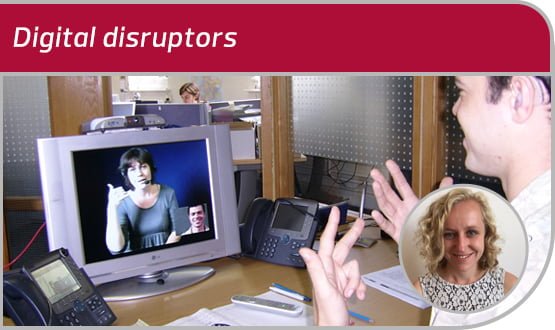Laura’s digital disruptors: GP video consultations

The idea of David Cameron as prime minister may be starting to feel like a distant memory; but it was only in May 2015 that he got some positive headlines for saying that patients should be using online and video consultations.
At the time, uptake in the NHS was low. The only exceptions were GPs serving remote communities and a few clinics experimenting with the idea for patients who found it hard to travel.
This month, at the Health and Social Care Expo in Manchester, Simon Stevens, the chief executive of NHS England, said things had moved on. “We’ve got a whole range of individual technologies that the NHS needs to get faster at adopting.”
Meanwhile, the number of private medical companies getting interested in the idea has grown considerably. Also, these companies are no longer outside the NHS looking in, but are at least in the hallway to see how their services might be received.
An app to act as a replacement locum
A company that generates a lot of press is Babylon Health. With its grandiose mission statement (“we will put accessible and affordable health service in the hands of every person on earth”) it aims to put doctors at your fingertips.
Babylon Health’s biggest offer is a subscription-based remote GP consultation service. If you’re a paying customer there is a rolling monthly subscription of £4.99; otherwise a single GP consultation is available for £25.
It was founded by former Circle chief executive Ali Parsa, and in June 2016, the company launched its first artificial intelligence capable of triaging patients.
NHS Southend Clinical Commissioning Group is using Babylon in two of its sites, Highlands Practice and Eastwood Group Practices. Covering just over 20,000 patients in Essex, the pilot started 18 months ago and allows those registered at the GP practices to download the app for free and book virtual consultations with a Babylon doctor.
Ian Ross, head of primary care at Southend CCG, said 20% of the Highlands registered list have signed up to the app, with an average of 50 to 60 consultations a week. The statistics show that 70% of patients have their queries resolved with no need for a face to face consultation.
Both Ross and Parsa comment that the commuting population of Southend makes Babylon particularly appealing. The scheme has also signed up pharmacies to dispense drugs, and participating chemists can be found in London terminals as well as more locally.
With access to patients’ clinical notes, and an ability to update them, Ross comments that “basically Babylon is a number of extra locum doctors”. Whilst Babylon charges for each consultation its does, Parsa says his service provides doctors at lower costs than putting locums in place.
Bringing avatars to life
Another CCG taking on a punt on apps is NHS Dudley CCG. It is trialling Sensely’s virtual nurse mobile triage app in two of its practices. The artificial intelligence avatar, appealingly named Olivia, can offer appointment scheduling, healthcare information, service location and a symptom checker.
The six month pilot has been running a few months, according to Ivana Schnur, co-founder and chief medical officer at Sensely, and it works alongside the traditional ways of contacting your GP.
Dudley has the right attitude, but the number of partners has presented challenges for Schnur. “I find that the willingness is there, the hunger is there, it’s just [that it is] the execution. It’s just a lot to take for a small company to work with all these different vendors, and bring it all together in time for it to still be innovative.”
Private expectations in a public service
With all the companies discussed having both a private business and an arm that delves into the world of GP practice and the NHS, Schnur is not the only one to encounter challenges.
Push Doctor has a rapidly expanding paid for, subscription doctor service, through which a basic ten-minute consultation costs £20.
The GPs on Push Doctor’s books are paid per consultation, and so the company’s model is not “to turn GPs on a digital health platform into a call centre environment”, but instead make use of their “incremental hours”, says founder and chief executive officer, Eren Ozagir.
On the other side of the coin, Ozagir says patients in the Woodlands Practice covered by NHS Oldham CCG have been accessing the technology for free in the form of Push NHS since 2014.
Push Doctor does not staff the NHS services, but has instead has sold the technology to the CCG. This means that patients can see their regular doctor after ringing the surgery, but the consultation is done over video.
However, on Woodlands’ website there is no link to Push Doctor’s services and a call to the surgery indicates that it may not be in use at the moment. A receptionist suggests its elderly population didn’t take to it.
Commenting on the contrast between the two parts of the company, Ozagir says: “One of the things that are difficult for private businesses working with the NHS is the length of time, and therefore money, that it takes to do anything.” In the NHS, he adds: “The cultural challenge, that we’ve seen most evidence of, is the reluctance to do something new.”
“Not” privatisation of the NHS
The media has been quick to damn these private companies getting involved with GP practices. Screaming headlines in The Daily Mail in mid-September about how ‘the GP will see you now – by webcam’ and ‘the NHS will pay’ – generated over one hundred seemingly outraged comments.
However, Ross at Southend pointedly explains that GP practices “to all extents and purposes, are independent businesses.”
For Ross, the benefits of the Babylon service lie in the financial benefits of needing fewer GPs if less face to face consultations are needed, more time freed up for the GPs themselves and the convenience factor for the patients.
Lee Dentith, founder of NowHealthcare Group, emphatically observes that these companies are not actually working with ‘the NHS’ if that means the national healthcare system headed by the health secretary and the commissioning board in Leeds.
“Our competition, as such, have worked with a couple of GP practices and effectively portrayed that they’re working with the NHS. They’re not. They’re actually working for an individual entity providing some services.”
NowHealthcare is a Liverpool born telehealth organisation, and its Dr Now offering connects patients with a doctor. Its unique selling point is that the company has its own pharmacy, so it can courier medicines directly to a home or business. Dentith boasts that the record time to date is delivering medicines is 27 minutes.
What’s the future?
Dentith has big ambitions for his company. In three to five years he would love and aims to service 100 million appointments through the platform.
He also sees the company as providing part of the solution to beleaguered NHS 111. “We are hoping to see some high level talks in the coming months to understand how to build the infrastructure at this level with the NHS.
“We don’t just want to work with individual practices at this point, because we don’t believe it’s the ultimate solution. The ultimate solution is the 111 level.”
Ozagir also predicts the future lying in the combination of private companies and the NHS: “I believe certain things can be accomplished outside the NHS and then brought in to drive efficiency and I think primary care, and digital primary care is one of those things.”
Yet there are huge lifestyle hurdles to overcome. A recent report from the digital inclusion charity, Tinder Foundation, found that in the UK 12.6 million people lacked basic digital skills, and 5.3 million adults had never used the internet.
As Ross acknowledges: “The biggest challenge is the cultural challenge and people accessing primary care in slightly different way”.
About the author: Laura Stevens joined Digital Health News in summer 2016 and covers the ‘digital patient’ beat – covering the latest in mobile, online, apps, start-ups, and disruptive technologies of all kinds. Follow her @DH_LauraStevens




